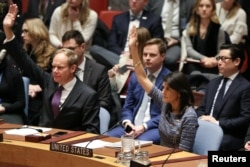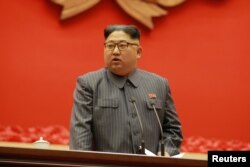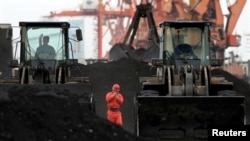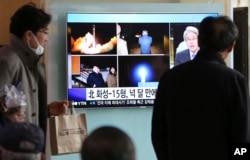North Korea’s foreign ministry is calling the latest United Nations sanctions an “act of war” and “tantamount to a complete economic blockade.”
In a statement carried by the North Korean state news agency, KCNA, the ministry’s spokesman says Pyongyang “categorically rejects the resolution,” which it says is the result of U.S. terror at the success of its nuclear and missile programs.
The U.N. Security Council unanimously agreed Friday to impose another round of sanctions on North Korea, targeting sectors that fuel its illicit weapons programs.
“As we have in the past, we will continue to match the Kim regime’s choice of aggressive actions with actions of international sanction,” U.S. Ambassador Nikki Haley said, referring to North Korean leader Kim Jong Un.
Sunday’s statement from North Korea challenged that assertion, saying “If the U.S. wishes to live safely, it must abandon its hostile policy ... and learn to co-exist with the country that has nuclear weapons.”
It also said that the countries that supported the sanctions resolution would “be held completely responsible for all the consequences,” and that Pyongyang would make sure “for ever and ever that they pay (a) heavy price.”
The new resolution builds on three earlier rounds of tough sanctions imposed on Pyongyang this year.
If fully implemented, it will cap North Korea’s annual import of refined petroleum products, such as gasoline and diesel, at a half-million barrels, down from 4.5 million in 2016. Exemptions would only be allowed on a case-by-case basis with Security Council approval.
North Korean workers, wages
The measures also seek to cut off revenue from North Korean laborers sent abroad to work.
Their wages are often partially or completely confiscated by the regime to fund its illicit programs. Under the new resolution, all North Korean laborers must return home within two years.
The United States, which drafted the text, estimates that 50,000-80,000 North Koreans work in China and about 30,000 more in Russia.
U.S. President Donald Trump tweeted Friday, “The United Nations Security Council just voted 15-0 in favor of additional Sanctions on North Korea. The World wants Peace, not Death!”
Some council members also have noted that North Korea appears to be illegally exporting coal and acquiring prohibited oil through deceptive shipping practices. The new measures attempt to close loopholes in maritime interdiction and inspection regimes to prevent that.
North Korea will also be prohibited from importing all industrial machinery and equipment, and some transport vehicles, which the U.S. says accounted for one-third of the country’s 2016 imports.
An additional 15 North Korean individuals, most of them in the banking sector, have been designated for travel bans and asset freezes, as well as the army ministry.
“The unity this council has shown in leveling these unprecedented sanctions is a reflection of the international outrage at the Kim regime’s actions,” Ambassador Haley said.
Newly developed missile
The sanctions are in response to Pyongyang’s November 28 launch of a newly developed intercontinental ballistic missile (ICBM) called a Hwasong-15. North Korea claims the missile is capable of delivering nuclear warheads anywhere in the continental United States.
The test was Pyongyang’s third ICMB test this year and its 20th ballistic missile launch of 2017. Its intensified defiance has frustrated longtime patron, China.
“China urges DPRK to take seriously the demands of the international community, abide by and implement the council resolutions and refrain from conducting any further nuclear and missile tests,” said China’s deputy U.N. ambassador, Wu Haitao, using the abbreviation for North Korea’s formal name.
“If the situation of the peninsula is allowed to stay in the current vicious cycle, the road will be narrower and narrower,” Wu said, urging a swift return to talks. “Only by meeting each other halfway and through dialogue and consultations can a peaceful settlement be found.”
Russia’s deputy envoy, Vladimir Safronkov, expressed frustration that the negotiation of the draft text did not include wider and lengthy discussions among all council members. Diplomats have said the main sanctions were agreed upon in bilateral negotiations between the U.S. and China.
The Russian envoy said his delegation only supported the text because some of their concerns, including lengthening the amount of time for North Korean workers to return home and removing some individuals from the blacklist, were accommodated just before the vote.
This is the fourth round of targeted sanctions imposed by the Security Council this year and the 10th since 2006, all aimed at stopping Pyongyang advancing its illicit weapons programs and move it to the negotiating table.
Earlier this month, the U.N.’s political chief visited Pyongyang. His visit was the first in-depth political exchange of views between U.N. and North Korean officials to take place in the DPRK in almost eight years.
U.N. Secretary-General António Guterres welcomed the council’s unanimous adoption in a statement.
“The only way forward for a comprehensive peaceful and political solution requires de-escalation and open communication channels, now,” Guterres’ spokesperson said.
Margaret Besheer contributed to this report.









